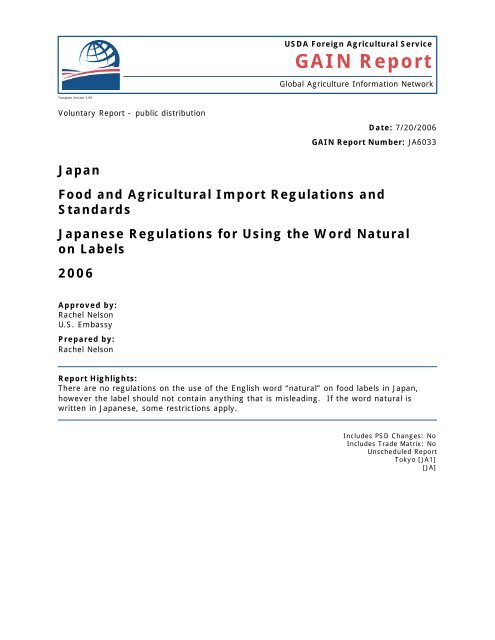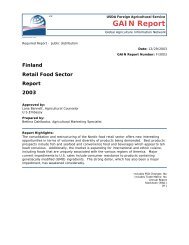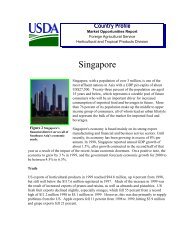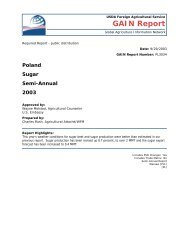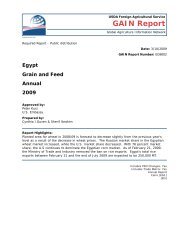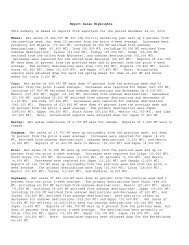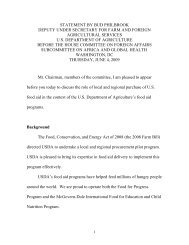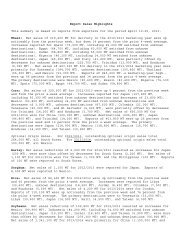GAIN Report - Foreign Agricultural Service
GAIN Report - Foreign Agricultural Service
GAIN Report - Foreign Agricultural Service
You also want an ePaper? Increase the reach of your titles
YUMPU automatically turns print PDFs into web optimized ePapers that Google loves.
USDA <strong>Foreign</strong> <strong>Agricultural</strong> <strong>Service</strong><br />
<strong>GAIN</strong> <strong>Report</strong><br />
Global Agriculture Information Network<br />
Template Version 2.09<br />
Voluntary <strong>Report</strong> - public distribution<br />
Date: 7/20/2006<br />
<strong>GAIN</strong> <strong>Report</strong> Number: JA6033<br />
JA1234<br />
Japan<br />
Food and <strong>Agricultural</strong> Import Regulations and<br />
Standards<br />
Japanese Regulations for Using the Word Natural<br />
on Labels<br />
2006<br />
Approved by:<br />
Rachel Nelson<br />
U.S. Embassy<br />
Prepared by:<br />
Rachel Nelson<br />
<strong>Report</strong> Highlights:<br />
There are no regulations on the use of the English word “natural” on food labels in Japan,<br />
however the label should not contain anything that is misleading. If the word natural is<br />
written in Japanese, some restrictions apply.<br />
Includes PSD Changes: No<br />
Includes Trade Matrix: No<br />
Unscheduled <strong>Report</strong><br />
Tokyo [JA1]<br />
[JA]
<strong>GAIN</strong> <strong>Report</strong> – JA6033 Page 2 of 3<br />
There are no regulations in the Japan <strong>Agricultural</strong> Standards (JAS) specifically defining what<br />
natural is. In general, the definition is based on what consumers will accept. However, for<br />
some commodities, the Quality Labeling Standard (QLS) defines how the term can be used<br />
in relation to that commodity. Specifically, for some commodities the QLS prohibits the<br />
words shizen or tennen, which mean natural in Japanese, from being used. One example is<br />
soy sauce. The standards for soy sauce say that if it is processed, which all soy sauce is, it<br />
cannot be labeled as shizen. This interpretation varies by commodity and does not apply to<br />
all processed foods. Currently, these regulations apply to the word in Japanese only, and so<br />
any product can have the word natural in English. As a rule, though, product labels should<br />
not contain anything misleading.<br />
When the product is imported into Japan, there are certain labeling requirements and in the<br />
required information about ingredients, the word shizen or natural should not be used, since<br />
the ingredients should be listed as simply as possible, without unnecessary adjectives. So<br />
for example if natural sugar is used, the ingredients on the label should only say sugar and if<br />
the word natural is to be used it should be outside of that mandatory part of the label.<br />
The QSL only applies to information on the product package itself, so the word natural can be<br />
written in Japanese or English on separate advertising or POP material. Even if a product<br />
bans the use of the word natural on the label in Japanese, there can be a sign right next to<br />
the product in Japanese using the word, for example it could say “This product is approved<br />
as natural by USDA”. However stores often ask for proof that the product is in fact natural<br />
before allowing such advertising, and that is at the discretion of the store.<br />
If the use of the word natural in Japanese is to be used, MAFF recommends coming to them<br />
for a consultation first. MAFF also requires that if exporters bring in any new kind of product<br />
that has never been imported to Japan before, they should have the product documentation<br />
and packaging reviewed by MAFF.<br />
In summary, the JAS Law allows companies to voluntarily label products as natural in<br />
Japanese or in English on foods and food ingredients, other than those specified by the<br />
Individual Quality Labeling Standards under the JAS Law.<br />
Those products for which labeling as natural is prohibited by the Individual Quality Labeling<br />
Standards under the JAS Law are listed below:<br />
1. Certain processed foods<br />
a. Canned and bottled vegetable and fruits products<br />
b. Fruit beverages, including vegetable mixed juice in which no less than 50% fruit juice<br />
is added<br />
c. Soy milk, prepared soymilk and soy drink<br />
d. Carrot juice, mixed carrot juice<br />
e. Tomato products (tomato juice, mixed tomato juice, tomato ketchup,<br />
tomato puree etc.)<br />
2. Processed marine foods<br />
a. Dried cultured wakame seaweed<br />
b. Salted cultured wakame seaweed<br />
Note: Naturally grown wakame seaweed can be labeled as natural.<br />
3. Seasoning<br />
a. Vinegar (rice vinegar, apple vinegar, grape vinegar etc.)<br />
b. Flavored seasonings<br />
c. Soy sauce (except those without the use of food additives)<br />
UNCLASSIFIED<br />
USDA <strong>Foreign</strong> <strong>Agricultural</strong> <strong>Service</strong>
<strong>GAIN</strong> <strong>Report</strong> – JA6033 Page 3 of 3<br />
d. Soy bean paste<br />
Note: Soy sauce manufactured without the use of food additives can be<br />
labeled as natural.<br />
4. Other foods<br />
Retortable pouched food (rice, curry etc.)<br />
UNCLASSIFIED<br />
USDA <strong>Foreign</strong> <strong>Agricultural</strong> <strong>Service</strong>


